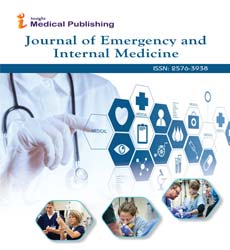ISSN : 2576-3938
Journal of Emergency and Internal Medicine
Internal Medicine and Its practice in Medical Field
John Bravia*
Department of Cardiology, Stanford University Stanford, USA
- *Corresponding Author:
- John Bravia
Department of Cardiology, Stanford University Stanford, USA
E-mail: BraviaJ12@gmail.com
Received Date: December 03,2021; Accepted Date: December 16,2021; Published Date: December 23,2021
Citation: Bravia J (2021) Internal Medicine and Its Practice in Medical Field. J Emerg Intern Med Vol.5 No.3
Introduction
There is a dichotomy in the practice of internal medicine. On the one hand is the lure of specialization, of becoming expert and authoritative in very narrow fields. On the other hand, there is the need to retain the ability to treat patients in a holistic manner nothing but with utmost care and following guidelines as per proposed protocol.
Many patients present with undifferentiated illness, often accompanied by multiple comorbidities. These people require a physician with the skills to sort out multiple problems in the context of their overall health, both physical and psychological, while taking into account their social and cultural background. Too often the sub-specialist has lost the will or confidence to manage a patient's problems when they fall outside a particular organ system. For best outcomes, care must be highly coordinated; fragmented care puts patients at risk which is becoming a major problem these days. For example, post appendectomy experienced patient affected with stomach infection so firstly, they will be undergoing endoscopy followed by reaching out gastroenterologist. After completion of course to avoid stomach infection by usage of gastric medication lead to kidney bulging and stones. This further lead to approach of nephrologist. How long this will be continued is an unknown question. Physicians as medical experts must take a leadership role here; it is not the responsibility of someone else.
Description
As life expectancy rate increases in populations, which results in both improved living conditions and survival rate is decreasing due to the course of much chronic disease being amelio-rated, physicians need to maintain the skills to manage the elderly people’s health. There is no doubt that the elderly experience unique and also it differs from patient to patient as everybody have their own individual environments and problems. At that time, internal medicine comes into existence.
Physiological and pathological changes, but too often physicians fail to factor this into their decision-making. Similarly, the care must be appropriate for each individual, and that care should be toward the end of life withholding potential which will be a much better choice than attempting heroic but clinically futile measures.
Arguments are made that there should be a renaissance of generalism, particularly in the hospital setting, to allow for more holistic and rational treatment for patients. Perhaps a better alternative would be for all of us in the field of internal medicine to strive to practice as internist first and sub-specialist second. We also help patients more effectively when we work as part of a healthcare team, recognizing and employing the unique skills of colleagues as well as nursing and allied health staff.
Conclusion
Most importantly, the care of patients should be conducted in a partnership with the patient, and often also with their family where we can gather the health information of the patient only from the family. No amount of technical knowledge and procedural expertise on the part of the physician can treat patients effectively in the absence of trust and empathy. Communication skills need to be increasingly sophisticated because friendly nature between doctor and patient sometimes helpful. Poor outcomes for patients occur much more frequently through failures of communication than due to a lack of scientific knowledge on the part of physicians.
Open Access Journals
- Aquaculture & Veterinary Science
- Chemistry & Chemical Sciences
- Clinical Sciences
- Engineering
- General Science
- Genetics & Molecular Biology
- Health Care & Nursing
- Immunology & Microbiology
- Materials Science
- Mathematics & Physics
- Medical Sciences
- Neurology & Psychiatry
- Oncology & Cancer Science
- Pharmaceutical Sciences
